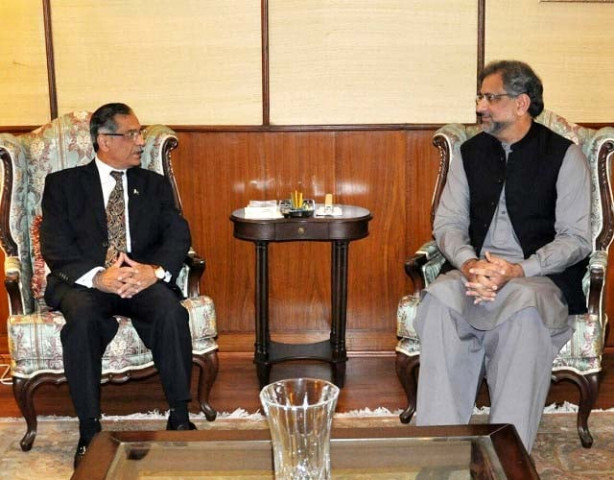Top judge rejects talk of NRO-style deal
Justice Nisar says will not disappoint legal community

PM Abbasi assures CJP Nisar all possible assistance in revamping judicial system of the country as visualised by the chief justice. PHOTO: EXPRESS
The CJP made these remarks on two separate occasions before lawyers respectively associated with the two major opposition parties – the Pakistan Tehreek-e-Insaf (PTI) and the Pakistan Peoples Party (PPP).
Hearing a suo motu case regarding illegal encroachment in Murree, the CJP addressed the PPP’s Sardar Latif Khosa, who had objected to the CJP’s Tuesday meeting with the premier in his chamber during a TV talk show.
The CJP told Khosa that he is like Khosa’s younger brother and that he ‘just wants to convey’ that he did not lose anything [by meeting the PM] but gained. The premier had come to meet me and not vice versa, he said.
Unusual moot: Abbasi promises to achieve CJP’s ‘vision’
Giving general remarks, the CJP said the applicants come with their pleas and it is his duty to hear everyone’s requests. He also asked Khosa to avoid negative thinking and to trust him and judiciary.
Earlier, during hearing of another case related to the deputionists in the Capital Development Authority (CDA), the CJP also addressed Naeem Bukhari, who is associated with the PTI.
“There is no concept of ‘judicial martial law’ or ‘judicial NRO’. There will be nothing other than [rule of] the Constitution and democracy,” he said in an apparent reference to a PTI statement, issued on the day of his meeting with the PM rejecting any possible NRO to bail out the former PM Nawaz Sharif.
Addressing a ceremony in the evening, the CJP said he has no interest in executive affairs but it is his duty to pass directives for the enforcement of fundamental rights. “The right to life is a fundamental right of every citizen. The right to life means good life,” he added.
Rebuttal
Later, the Supreme Court’s registrar office issued a clarification regarding the news reports – aired by different media channels – that claimed that the CJP used the word ‘Faryadi’ for prime minister.
“It is categorically stated that this attribution to the Hon’ble Chief Justice of Pakistan Mr Justice Mian Saqib Nisar is completely wrong and malicious. The Hon’ble Chief Justice holds the Prime Minister in high esteem, being the head of the government, and has never used the word ‘Faryadi’ for him. Any misgivings in this regard should, therefore, be put to rest,” said the clarification.
Legal experts’ view
Senior lawyers believe that the CJP should not give such clarifications regarding his meeting with the premier while the ruling Pakistan Muslim League-Nawaz (PML-N) lawyers said the top judge should not have made such remarks before the counsels who belong to the opposition parties.
What can be done against Nawaz Sharif, he is nobody now: CJP
An insider revealed to The Express Tribune that aim of PM Abbasi’s meeting was to request the CJP to show judicial restraint in matters related to governance as he (PM) will also request the former PM Nawaz Sharif not to criticise the judges.
The sources said the National Assembly Speaker Ayaz Sadiq had convinced Sharif to give green signal to the PM to hold meeting with the CJP.
However, the Pakistan Bar Council Vice Chairman Kamran Murtaza raised objections over the meeting between the chief justice and premier, adding that judges should not meet political leaders.
Murtaza also objected to the statement issued by the Supreme Court in the wake of the rare meeting which said the PM assured the CJP that all steps will be taken to materialise his ‘vision’ with respect to free education, public health, provision of clean drinking water, sanitation and environment etc.
“The judges do not have ‘vision’ as this term is used for the political leaders. The judges’ vision should only be confined to improvement of the justice system,” he added.



















COMMENTS
Comments are moderated and generally will be posted if they are on-topic and not abusive.
For more information, please see our Comments FAQ